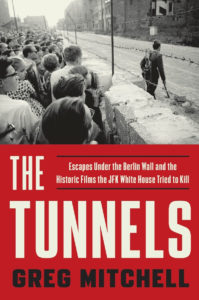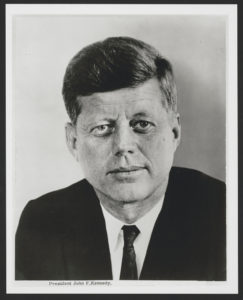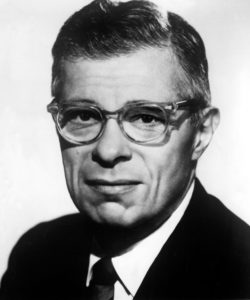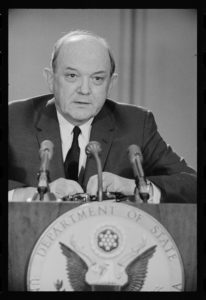 President John F. Kennedy in 1962 approved attempts by his State Department to suppress NBC and CBS television coverage of escape tunnels under the Berlin Wall. The full story is told for the first time, thanks to recently declassified cables and memos, in Greg Mitchell’s book The Tunnels: Escapes Under the Berlin Wall and the Historic Films JFK Tried Kill, published in paperback this month by Broadway Books.
President John F. Kennedy in 1962 approved attempts by his State Department to suppress NBC and CBS television coverage of escape tunnels under the Berlin Wall. The full story is told for the first time, thanks to recently declassified cables and memos, in Greg Mitchell’s book The Tunnels: Escapes Under the Berlin Wall and the Historic Films JFK Tried Kill, published in paperback this month by Broadway Books.

[dropcap]N[/dropcap]early every American president has had a rocky relationship with the press, sometimes to the point of seeking to suppress sensitive or critical reports. President John F. Kennedy, a media darling, was no different. In a striking episode, Kennedy and Secretary of State Dean Rusk in 1962 brought to bear extraordinary pressure that induced CBS-TV to kill a news report by correspondent Daniel Schorr and forced NBC to postpone a primetime special. When the NBC show finally did air, the special drew wide acclaim and is now considered a landmark in television history.
Cables to and from the State Department, the White House, and the U.S. Mission in West Berlin, detail sustained efforts in mid-1962 to squelch the two productions. These efforts included Rusk’s face-to-face showdowns with network executives in his office at the State Department, and between U.S. diplomats and an angry Daniel Schorr in Germany. Schorr remained bitter about the episode until his death.
CBS and NBC had been racing to be first to cover the phenomenon of tunnels being dug under the Wall by young men in West Berlin to bring to freedom friends, spouses, lovers, family members and strangers from East Berlin. Cables reveal that JFK and Rusk feared that dramatic TV coverage would suggest the United States supported such escapes, perhaps exacerbating tensions with the Soviets in Berlin, the world’s most dangerous Cold War hotspot.
The White House, while publicly expressing support for attempts by citizens in communist East Berlin to gain freedom, had decided to focus exclusively on West Berlin’s survival, hence the reluctance to provoke the Soviets.
“A wall is better than war,” Kennedy told an aide. To another he explained, “We don’t care about East Berlin.”
In early August, American diplomats, tipped off by an American magazine writer close to the tunnelers, repeatedly tried to convince Schorr to drop his TV project, claiming coverage of the tunnels would “raise tensions.” The chief of the politics desk at the U.S. Mission in Berlin advised a superior, “If Schorr does not agree, we may recommend CBS in US be approached by department.” Documents chronicle the bullying of Schorr, who remained unshaken.

(Everett Collection Inc / Alamy Stock Photo)
With White House approval, Rusk summoned Schorr’s boss, CBS news director Blair Clark–-a longtime friend of President Kennedy–-to the State Department. It was just before midnight on August 6, 1962, the eve of the escape from the tunnel that Schorr had been covering. With three CIA officials present, Rusk convinced Clark to call Schorr and order him to desist. His coverage would amount to a “provocation,” Clark told the correspondent.
At midnight, Rusk was to cable a State Dept. official in Berlin: “I saw Clark tonight and he agreed scrub CBS participation in tunnel project.” To make sure, Rusk met with Clark again in the morning. Diplomats in Germany soon were warning Schorr to leave the tunnel story alone, but complained that the reporter did not appear “contrite.”
“US officials have no apology for prompt actions taken with CBS and Schorr,” Rusk informed subordinates and the White House. “Schorr involved himself in a matter which was far beyond his private or journalistic responsibilities….”
The head of the U.S. Mission in Berlin urged Rusk to consider “high-level intervention with NBC along general lines taken with CBS” to keep that network from broadcasting tunnel coverage. Soon a top Rusk aide was pressuring the NBC news chief.
Since June, NBC secretly had been funding and filming work on another tunnel, through which 29 East Germans fled on September 14 and 15. Coverage of that escape alerted the White House to that tunnel project and to NBC plans for a primetime special about it. The State Department quickly raised objections. Documents reveal that CBS, having buckled, now was lobbying the State Department to quash NBC’s scoop.
In an extraordinary cable, George W. Ball, an undersecretary of defense, informed the State Department that CBS manager Blair Clark “has justifiably asked whether his excellent cooperation in suppressing CBS effort on earlier tunnel project has in effect left CBS out in the cold. Department feels obliged give him all available information” about the NBC film. Ball didn’t say what he expected CBS to do with that information. A copy of the Ball cable was forwarded to Kennedy aides McGeorge Bundy and Pierre Salinger, firmly linking the White House to the pressure on NBC.

The head of the Berlin Mission cabled Rusk that American journalists in Germany were still not heeding State Dept. warnings and persisting in covering escapes. Officials would continue to try to “prevent” such reports, the official vowed, but suggested that the “most effective contact” might be with the headquarters of media organizations at home.
Rusk suggested NBC “abandon” its film project. His chief spokesman labeled the program “risky” and “irresponsible” and “not in the national interest.” Officials in West Berlin also voiced opposition to airing the program, scheduled to air at the end of October. When NBC did not immediately respond, Rusk summoned network executives and the program’s producer, Reuven Frank, to his office, again with White House support. State Department correspondent Elie Abel also attended. Their program was not in “the national interest,” the Secretary of State told them. “This is a program about human freedom!” replied Elie Abel, the network’s State Department correspondent. “Does the Department consider that in the national interest?”
Piers Anderton, the NBC correspondent who had directed that network’s tunnel film, wrote from New York to his wife in Germany that it looked like his program would never be aired “or may go on, cut to ribbons. If the latter, neither Reuven nor I would have anything to do with it.”
On October 21, NBC postponed the late October air date, saying nothing about rescheduling. Expecting an outright cancellation, producer Reuven Frank composed a letter of resignation. He thought NBC, whose subsidiary RCA stood to lose lucrative military contracts if the government retaliated, would cave.
Six weeks later, NBC, after allowing emotions to cool, quietly aired The Tunnel. The documentary won three Emmys, including “Program of the Year”—a first for a nonfiction production. Accepting the award, Reuven Frank blasted the U.S. State Department, whose U.S. Information Agency later bought more than 100 copies of The Tunnel from NBC to distribute abroad. Reuven Frank went on to become president of NBC.
Read more about the author’s The Tunnels: http://gregmitchellauthor.com
Watch Daniel Schorr talk about the 1962 incident: https://www.youtube.com/watch?v=XQtZlGa7KK8
Watch the entire NBC program: http://www.nbcnews.com/video/nbc-news/33623268
Purchase the book: The Tunnels: Escapes Under the Berlin Wall and the Historic Films JFK Tried Kill





